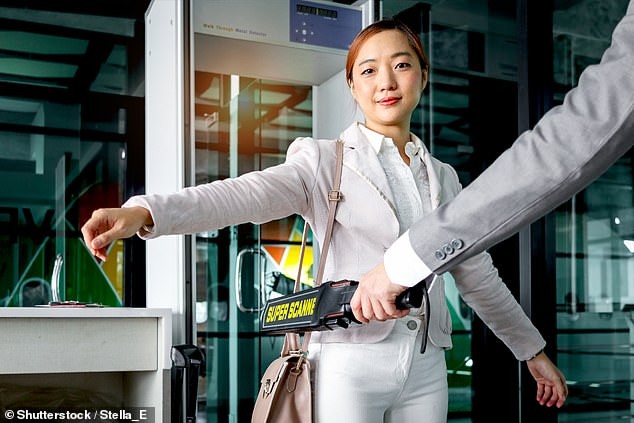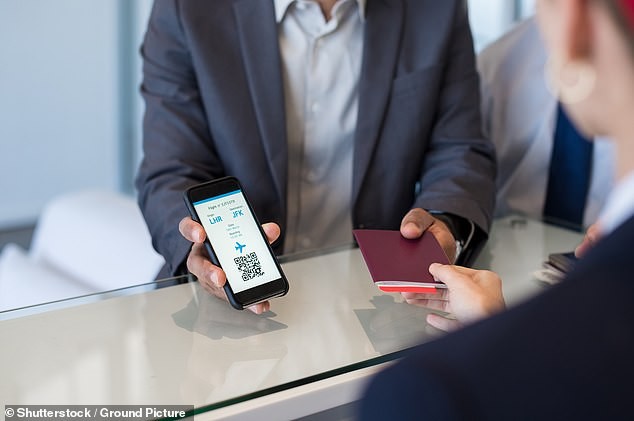Travel at Breakneck Speed with AI Corridors Flying Taxis and Doors That Open Before You Arrive
The dream of a sun-soaked getaway is almost within reach, but the journey to the hotel is where most people lose the thrill. The bags are packed, the alarm is set, and it’s not long until you can throw on that new bikini or pair of trunks and jump into the hotel pool. Yet the path there has long meant queues, grumpy officials, and the fear of missing a flight. This is changing. Airports, airlines, and hotels are turning to scientists to speed up every step of the journey, from the latest AI advances to Jetsons-like flying taxis. This month, the Daily Mail visited technology expo GITEX Global in Dubai to learn how travelers who can’t wait for a holiday to start could soon get there faster.

In This Article:
- Dubai’s AI powered passenger corridor lets you stroll through without documents
- Hexwave: MIT’s instant 3D body scanners using AI to spot threats
- Digital twin maps real-time airport flow to track every passenger
- Flying taxis could cut airport to hotel trips to minutes
- Hotels embrace facial recognition to skip to your room
- Abu Dhabi rolls out smart hotel check‑in with facial recognition
Dubai’s AI powered passenger corridor lets you stroll through without documents
Dubai International Airport has introduced an AI-powered passenger corridor, where cameras – housed in pillars on either side – scan passengers’ faces as they walk through and check them against pre-registered biometric data. ‘There are no barriers,’ says an Emirates representative, who explains that ten people can go through in just 14 seconds. Any anomalies are flagged to security officials who can intervene – but you won’t see them until then, he adds. Say goodbye to waiting at passport control for stony-faced officials to stamp your ID. Even those clunky e-gates will soon be old hat. Now at one airport you can simply stroll through without showing your documents – or even having to stop.

Hexwave: MIT’s instant 3D body scanners using AI to spot threats
Launched last spring, the service is currently only available for business and first-class passengers who depart from Terminal 3, but it’s expected to continue expanding across the airport. Called Hexwave, the new body scanners are able to create an instant 3D image of a person – and then use AI to detect whether any object on them is a threat or benign. If a prohibited item is detected, the system flags it to staff who can intercept the passenger. Several US airports are trialling the technology to check passengers and staff.

Digital twin maps real-time airport flow to track every passenger
New ‘digital twin’ technology – essentially a 3D virtual model of the airport in real-time – can now track every passenger from the moment they check-in to when they finally board the plane. ‘If a passenger isn’t on their flight, you can see exactly where they are stuck and help them,’ says Bashar Dbissi, senior manager at Dubai International Airport, which is testing the technology in Terminal 2. Each passenger is tagged with a unique identifier on arrival and then monitored by sensors throughout their journey to the gate. Officials hope to roll it out across the airport by the end of the year. Several other airports – including Sydney, Vancouver and Amsterdam Schiphol – are also developing the tech.

Flying taxis could cut airport to hotel trips to minutes
When you land, the world may be waiting for you in the air. US firm Joby Aviation has designed an electric vehicle that can whisk passengers at about 322 km/h from the airport to their hotels in minutes. Using six propellers to take off and land vertically, it can carry four passengers at a time and, because it’s electric, sounds no louder than a conversation. Joby – which is looking to launch in the UK, US, UAE, Japan and South Korea – is aiming to make the flights cost no more than a regular Uber. In Dubai, where it is closest to becoming a reality as soon as next year, it takes only 12 minutes from the airport to Palm Jumeirah, compared to 45 minutes by car. In London, where Joby recently partnered with Virgin Atlantic, the hour and a half drive from Heathrow to Canary Wharf is cut to eight minutes.

Hotels embrace facial recognition to skip to your room
You arrive at your hotel and discover a new kind of line at reception: you walk past the desk because your face is the key. At Sequence Hotels in Japan, a country known for its futuristic tech, guests can register a selfie before they arrive. All they need to do at check-in is smile at the facial recognition camera and the system will direct them straight to their room – taking 30 seconds. Fear not, by next year you may be able to skip the traffic completely and jump in a flying taxi. At an increasing number of hotels, you can now smugly walk past and straight to your room using your face as the key (stock). Even if people are arriving in a group, the system – developed by NEC Global – can accurately identify, cross-check and authenticate everyone. The chain is looking to expand the tech to other parts of the guest experience – including sightseeing, shopping, and getting around the city.

Abu Dhabi rolls out smart hotel check‑in with facial recognition
In Abu Dhabi, the government is rolling out smart check-in to every hotel. Tourists, whose faces were scanned on landing, can check-in en route to the hotel by taking a selfie. The data is received by immigration authorities. Guests then receive a smart key that lets them go straight to a room.


